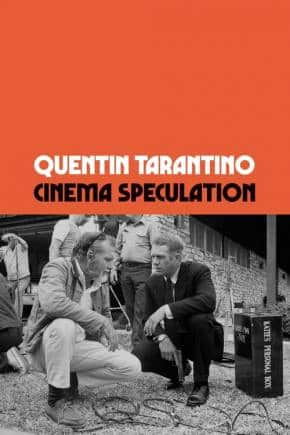



Quentin Tarantino has repeatedly stated that he will stop directing movies after making his tenth film. His last release, 2019’s Once Upon A Time In Hollywood, is his ninth movie, and Tarantino is engaging in every distraction possible to keep his final rodeo at bay. He first wrote and published the novelization of Once Upon A Time In Hollywood earlier this year. A few months ago, he launched the Video Archives Podcast with his  Pulp Fiction co-writer and friend Roger Avary. Last week he announced plans to direct an eight-episode television show. And he has just released his first non-fiction book - Cinema Speculation, a set of essays on the films that influenced his early years and his career.
Pulp Fiction co-writer and friend Roger Avary. Last week he announced plans to direct an eight-episode television show. And he has just released his first non-fiction book - Cinema Speculation, a set of essays on the films that influenced his early years and his career.
I must confess - I didn’t actually read the book. I was about two pages in, when I realised I was reading it in Tarantino’s voice - that breathlessly excited, irrationally confident, machine-gun delivery that only he has. At that point, I decided to switch to the audiobook, narrated by Edoardo Ballerini, with a special assist from Quentin himself. Tarantino narrates the opening and closing chapters - the most personal ones - about his childhood experiences at the movies with his mother called "Little Q Watching Big Movies", and about a notable influence on his adolescent years at the movies titled "*Floyd Footnote".
Tarantino doesn’t hold anything back; but it’s clear he’s not as self-aware as he thinks he is. The two personal essays pretty much explain the genesis of who he is as a fan, a filmmaker and a storyteller, and by extension, who he is as a person. He speaks very fondly of the Tiffany Theater, where he watched most of the movies (which reminded this reviewer of his own relationship with Sathyam Cinemas in Chennai).
Quentin had a deal with his mother, Connie - he could join her and his stepfather, Curt, on movie nights as long as he kept quiet and behaved himself. Accompanied by his parents, Tarantino watched a number of otherwise age-inappropriate movies, and got to listen in on adult conversations dissecting these movies. As Connie put it, “Quentin, I worry more about you watching the news. A movie is not going to hurt you.” On one of the rare occasions when she didn’t let him watch a movie, she explained, “Well, Quentin, it’s very violent… since you wouldn’t understand the context in which the violence was taking place, you would just be watching violence for violence’s sake. And that I don’t want you to do.” No matter which side of the Tarantino-violence debate you land on, it’s hard to argue that Quentin himself isn’t constantly grappling with the same question even today.
The second personal essay centres on Floyd, a one-time boyfriend of a friend of Connie’s and sometime renter of a spare room in Tarantino’s home. Floyd was a black man who worked the night shift at the post office. He had a near-encyclopaedic knowledge of Blaxploitation movies and rock-and-roll, especially Elvis, and he treated Tarantino like an adult. Their conversations about movies and popular culture form the basis for Tarantino’s own complicated relationship with black culture and the depiction of black people in his movies. Floyd was clearly not the best influence for an adolescent Quentin, but he was a defining influence in those teenage years. The first time Quentin read a screenplay, it was a Western that Floyd had written; and Tarantino belatedly thanks Floyd for seeding the idea for his own revisionist Western, Django Unchained.
The essays on film criticism start off with recognised classics like Bullitt, Dirty Harry, and Deliverance, before predictably diving into B-movie schlock. Tarantino’s essays are well-researched, sometimes with primary source interviews; and it’s clear he loves these movies even as he is being critical of them. Tarantino being Tarantino, he is prone to hyperbole and wild comparisons, like when he posits that a comically gruesome murder scene in sexploitation legend Russ Meyer’s Supervixens is “the only legitimate rival to Hitchcock’s shower scene in Psycho.” There’s an entire essay on Stallone’s Paradise Alley, but it’s largely a trojan horse to allow him to talk about his undying love for Rocky. It’s almost like Tarantino is too embarrassed to devote a chapter to a mainstream crowd-pleaser.
The central piece of Cinema Speculation is an alternate history where Tarantino imagines Taxi Driver as directed by Brian De Palma instead of Martin Scorsese. It almost happened, Paul Schrader was in talks with both Scorsese and De Palma before the project finally went forward with Scorsese. Tarantino seems obsessed with the fact that Scorsese cast Harvey Keitel in the role of the pimp Sport, who was originally written as black, and imagines that De Palma’s Sport would be played by a black actor, making the movie more authentic. He also calls out Scorsese for what he regards as hypocrisy regarding on-screen violence, and posits that De Palma would be less blinkered in this regard. It’s a fun exercise, and Tarantino vividly fleshes out his conception of De Palma’s Taxi Driver. Despite the speculation and his criticisms of Scorsese, it’s clear that Tarantino is a huge fan of Taxi Driver and its place in the pantheon.
Cinema Speculation is best summed up in Quentin’s words - if you're reading this cinema book, hopefully to learn a little something about cinema, and your head is swimming from all the names you don’t recognize, congratulations, you’re learning something.
Discover the latest Business News, Sensex, and Nifty updates. Obtain Personal Finance insights, tax queries, and expert opinions on Moneycontrol or download the Moneycontrol App to stay updated!